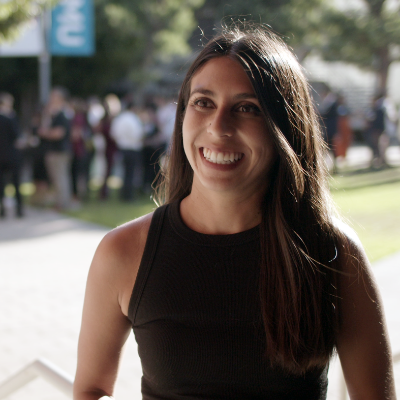Fourth-year evening student and advanced clinical student in LLS' Youth Justice Education Clinic (YJEC) pursues opportunity to increase and improve the legal services available to the less fortunate in our society.

When Sarah Lucero ’23, a fourth-year evening student and advanced clinical student in LLS’ Youth Justice Education Clinic (YJEC), learned of the Skadden Fellowship Foundation, she imagined an opportunity to increase and improve the legal services available to the less fortunate in our society was too good to be true.
“When I first heard about it, it sounded like something unachievable for me,” said Lucero.
Following the encouragement of YJEC Supervising Attorney Vivian Wong, a former Skadden Fellow herself, Lucero seized on the opportunity to apply. The Skadden Foundation, which was founded in 1988, has been dubbed the “legal Peace Corps” by the Los Angeles Times. It provides fellows with a two-year salary to work full-time for a legal or advocacy organization of their choosing. In November, Lucero learned that she was one of 28 fellows to be named to the class of 2023.
“My project focuses on providing direct services, as well as movement lawyering, to Native families,” said Lucero. “Specifically Native youth with disabilities who are facing school pushout, which can be [enacted] through discipline issues such as suspension, expulsion, and disciplinary transfers.”
Professor Wong urged Lucero to apply after working closely with her in LMU Loyola Law School’s Youth Justice Education Clinic (YJEC) and the YJEC policy practicum, a course in which students are trained to engage in policy advocacy on issues facing the YJEC clinic’s clients. Wong was not surprised that Lucero was awarded the fellowship, partly due to Lucero’s time teaching special education in elementary and high school systems.
“When I first met Sarah, she told me right away that her teaching experiences led her to pursue education advocacy,” said Wong. “Her passion, authenticity, and commitment to upholding the dignity of her clients is exactly why I knew she’d be a great candidate for the Skadden Fellowship.”
That passion was on display during an Antelope Valley Union School District hearing this past July. Lucero made a public comment as part of her clerkship with Disability Rights California to protest the use of sheriff’s deputies for the school’s 2022-23 school security. Her advocacy was so strong that even the local newspaper took note.
“Schools should be a place designed for safety and learning for students to grow,” she said. “But instead, this report details an environment much more punitive than protective.”
Lucero cited a report released by the Office of Inspector General that found evidence of racial disparities and possible discrimination within police behavior in the district. She also made sure to note that students with disabilities are “three times more likely to be referred to police in comparison to non-disabled peers.”
“School discipline is a really big issue for students, especially students of color,” Lucero said. “Cancel the Contract and the Freedom Arts Squad are two grassroots organizations that have very specific goals in the Antelope Valley. We partner with them through Disability Rights California to provide the legal tools they need support with.”
The way Lucero tells it, her public comment would not have been possible without her YJEC experience. “I remember being so nervous about giving my first public comment during our policy class over a year ago. Now, because of the opportunities I've had with YJEC, I feel like I've grown a ton. "
Though the school’s contract ended up passing, Lucero’s impact may have ripples for years to come. She galvanized the student body into contributing their own protests and, in the process, taught them a valuable lesson about their civic agency and freedom of speech.
“The students decided to make a piece of artwork [as part of their protest,]” she said. “The board had to stop the hearing in the middle to call their lawyers because they didn’t consider it ‘speech.’ It really empowered the students [to say], ‘We can make a difference. We disrupted what was going on.’”
Lucero points to an Education Law class with Professor Megan Stanton-Trehan as the “starting point” for her journey in justice. As a part-time student and a full-time teacher at the time, Lucero was having a difficult time determining where her career was headed. She says Stanton-Trehan and Wong were integral in finding that balance and pushed her to pursue more legal opportunities.
“She told me about a policy practicum with Professor Wong,” said Lucero. “Through that experience, I did a summer clerking with her in the Youth Justice Education Clinic. I really had to re-evaluate, and all of the work I did there really set me up to get the clerkship with Disability Rights California.”
Between the clerkships and fellowships that she’s earned since leaving the teaching profession, Lucero continually came back to the mentorship that Stanton-Trehan and Wong provided, and credits them with helping her realize her potential in law.
“They really saw something in me that I didn’t even see,” she said. “They were the ones who were telling me, ‘We have these programs, we have these education classes.’ They knew I was a teacher, they knew this is what I wanted to do. They knew I was a part-time student and would’ve had a harder time because of that. They figured out a way to help me follow this path, even if it looked different than what others might have done.”